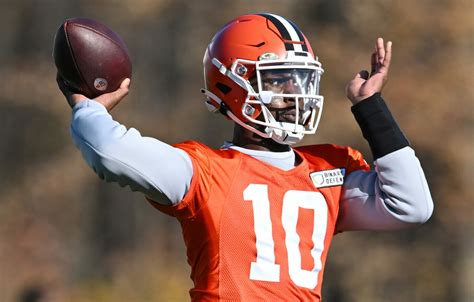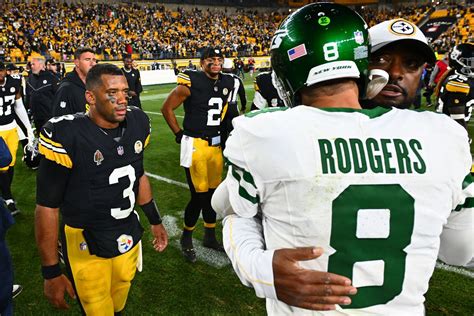
Dorian Thompson-Robinson, not Deshaun Watson, led the Cleveland Browns’ first-team offense during the opening organized team activities (OTAs), a surprising development signaling a strategic approach by head coach Kevin Stefanski to evaluate depth and manage Watson’s workload early in the offseason.
CLEVELAND – In a stunning turn of events at the Cleveland Browns’ organized team activities (OTAs), it was not franchise quarterback Deshaun Watson taking the first snaps with the first-team offense. Instead, Dorian Thompson-Robinson, the Browns’ fifth-round pick from the 2023 NFL Draft, unexpectedly found himself leading the charge, raising eyebrows and sparking considerable discussion among fans and analysts alike. This unforeseen decision by head coach Kevin Stefanski underscores the Browns’ commitment to thoroughly evaluating their quarterback depth and strategically managing Watson’s participation during the crucial offseason period.
The development, first reported during the OTA session, immediately ignited speculation regarding Watson’s health or potential limitations. However, reports indicate that Watson is healthy and participated in the OTAs, albeit with a modified workload. Stefanski’s choice to elevate Thompson-Robinson to the first team appears to be a deliberate move to gain a comprehensive understanding of the entire quarterback room, particularly Thompson-Robinson’s progress and readiness to contribute.
“We have a plan for each of these guys,” Stefanski said, addressing the media after the OTA session. He emphasized that the decision was part of a broader strategy to assess all players on the roster and optimize their development. “These OTAs are invaluable for getting reps, evaluating talent, and solidifying our game plan. We’re looking at every position, including quarterback, to ensure we have the best possible understanding of what each player brings to the table.”
Thompson-Robinson’s unexpected promotion presents a significant opportunity for the young quarterback to showcase his abilities and demonstrate his command of the Browns’ offense. Selected out of UCLA, Thompson-Robinson possesses a skillset that intrigues the Browns’ coaching staff, including his athleticism, arm strength, and ability to make plays both inside and outside the pocket. While he spent most of his rookie season on the sidelines, absorbing the nuances of the NFL game and learning from Watson and veteran backup Joe Flacco, this opportunity to lead the first team provides him with invaluable experience and a chance to prove his readiness to take on a more significant role in the future.
“Dorian is a talented young player with a lot of potential,” Stefanski commented. “He’s been working incredibly hard, both on and off the field, to improve his game. This is an opportunity for him to put that work into practice and show us what he can do.”
The Browns’ quarterback situation heading into the 2024 season is complex and multifaceted. Deshaun Watson remains the undisputed starter, and the team’s hopes for Super Bowl contention hinge heavily on his performance. However, Watson’s injury history and inconsistent play since arriving in Cleveland have raised concerns about his long-term durability and effectiveness. The Browns invested heavily in Watson, both in terms of trade capital and a fully guaranteed contract, so maximizing his potential is paramount.
Behind Watson, the Browns have been searching for a reliable backup who can step in and effectively manage the offense if needed. Last year, veteran Joe Flacco provided a spark, leading the Browns to the playoffs after Watson was sidelined with a season-ending shoulder injury. Flacco’s performance highlighted the importance of having a capable backup quarterback in the NFL, but he has since moved on, signing with the Indianapolis Colts.
The Browns’ decision to give Thompson-Robinson first-team reps suggests that they are seriously evaluating him as a potential option to fill that backup role. While he lacks Flacco’s extensive experience, Thompson-Robinson offers a different skillset with his athleticism and potential for growth. The OTAs provide a crucial window for the Browns’ coaching staff to assess his progress and determine whether he is ready to be the primary backup to Watson.
The ripple effects of this decision extend beyond the quarterback position. The first-team offense, including key players like Amari Cooper, Nick Chubb, and the offensive line, now have an opportunity to build rapport with Thompson-Robinson. This can be invaluable in the event that he is called upon to play during the regular season. The chemistry and understanding developed during these OTAs can make a significant difference in his ability to lead the offense effectively.
Moreover, the decision to give Thompson-Robinson first-team reps sends a message to the entire Browns’ roster. It demonstrates that the coaching staff is willing to give opportunities to young players who have shown dedication and hard work. This can create a more competitive and motivated environment within the team, as players know that their efforts will be recognized and rewarded.
From a strategic perspective, the Browns’ approach to OTAs reflects a proactive and forward-thinking mindset. By evaluating all quarterbacks on the roster, the coaching staff is better prepared for any unforeseen circumstances that may arise during the season. This is particularly important given the inherent uncertainty of the NFL, where injuries and unexpected events can quickly derail a team’s plans.
The Browns’ investment in their offensive line also plays a crucial role in this equation. A strong and reliable offensive line can help protect any quarterback, regardless of their experience level. With Pro Bowl caliber players like Joel Bitonio and Wyatt Teller, the Browns boast one of the best offensive lines in the league. This provides a solid foundation for Thompson-Robinson to operate effectively and showcase his abilities.
The Browns’ coaching staff has a proven track record of developing quarterbacks. Offensive coordinator Alex Van Pelt has worked closely with Watson to refine his mechanics and improve his decision-making. He also played a key role in Flacco’s resurgence last season. Van Pelt’s expertise and guidance will be invaluable in helping Thompson-Robinson reach his full potential.
The Browns’ emphasis on quarterback development also reflects a broader trend in the NFL. As the league becomes increasingly reliant on passing offenses, teams are placing a greater emphasis on finding and developing talented quarterbacks. The Browns’ decision to invest in Watson and draft Thompson-Robinson underscores their commitment to this trend.
In conclusion, the Browns’ decision to give Dorian Thompson-Robinson first-team reps during OTAs is a significant development that highlights the team’s commitment to evaluating its quarterback depth and strategically managing Watson’s workload. While Watson remains the undisputed starter, the Browns are clearly looking to develop Thompson-Robinson into a reliable backup who can contribute if needed. This proactive approach reflects a forward-thinking mindset and a recognition of the importance of quarterback depth in the modern NFL. The coming weeks of OTAs and training camp will be crucial in determining Thompson-Robinson’s readiness and his role in the Browns’ offense moving forward. The Browns are not merely content with Watson as their only option; they are actively cultivating a contingency plan and exploring the full potential of their quarterback room. The move underscores a commitment to thorough preparation and a desire to leave no stone unturned in their pursuit of success.
Further Context and Analysis:
The Browns’ quarterback saga has been a prominent storyline in recent years, marked by high expectations, significant investment, and periods of uncertainty. The acquisition of Deshaun Watson was a franchise-altering move, but his suspension and subsequent struggles to regain his Pro Bowl form have cast a shadow over the team’s aspirations.
Given this backdrop, the decision to provide Dorian Thompson-Robinson with first-team reps during OTAs should be viewed as a calculated move to address several key objectives:
-
Evaluating Backup Options: Joe Flacco’s departure created a void in the backup quarterback role. While Thompson-Robinson was drafted with potential, he remains largely unproven. OTAs provide the coaching staff with a valuable opportunity to assess his progress, evaluate his command of the offense, and determine whether he is ready to serve as the primary backup.
-
Managing Deshaun Watson’s Workload: Watson’s injury history is a legitimate concern. After undergoing shoulder surgery, the Browns are likely taking a cautious approach to managing his workload during the offseason. By giving Thompson-Robinson first-team reps, the Browns can ensure that Watson is not overexerted and has ample time to recover and prepare for the regular season.
-
Developing Thompson-Robinson’s Potential: Thompson-Robinson possesses the raw talent and athleticism that NFL teams covet in a quarterback. However, he needs to refine his skills, improve his decision-making, and gain valuable experience. OTAs provide him with an opportunity to work closely with the first-team offense, learn from Watson, and develop his game under the guidance of the Browns’ coaching staff.
-
Creating Competition and Motivation: By giving Thompson-Robinson a chance to compete for the backup quarterback role, the Browns are fostering a competitive environment within the team. This can motivate both Watson and Thompson-Robinson to work harder and improve their performance.
-
Preparing for the Unexpected: The NFL is a league of constant change and unforeseen circumstances. Injuries, trades, and other factors can quickly alter a team’s plans. By developing Thompson-Robinson, the Browns are ensuring that they have a capable backup quarterback who can step in and lead the offense if Watson is unable to play.
The Browns’ offensive scheme, under the direction of head coach Kevin Stefanski and offensive coordinator Alex Van Pelt, is designed to be quarterback-friendly and adaptable to different skillsets. The offense emphasizes a strong running game, play-action passing, and quick reads for the quarterback. This system can help Thompson-Robinson thrive by allowing him to rely on his athleticism and make quick decisions.
The Browns’ offensive line, as mentioned earlier, is a major strength. With stalwarts like Joel Bitonio and Wyatt Teller, the Browns boast one of the best offensive lines in the league. This unit can provide Thompson-Robinson with the protection and time he needs to make plays.
The Browns’ receiving corps, led by Amari Cooper, also offers a significant advantage for Thompson-Robinson. Cooper is a proven playmaker who can stretch the field and make tough catches. His presence can help Thompson-Robinson build confidence and make more aggressive throws.
Looking Ahead:
The coming weeks of OTAs and training camp will be crucial in determining Thompson-Robinson’s role in the Browns’ offense. He will need to demonstrate consistent improvement, command of the offense, and the ability to make smart decisions under pressure.
If Thompson-Robinson can prove that he is ready to be the primary backup, the Browns will have a valuable asset in their quarterback room. He can provide insurance in case of injury to Watson and allow the team to explore different offensive packages that take advantage of his athleticism.
However, if Thompson-Robinson struggles, the Browns may need to explore other options at backup quarterback. They could look to sign a veteran free agent or trade for a player who is more experienced and proven.
Ultimately, the Browns’ success in 2024 will depend on the performance of Deshaun Watson. However, the team’s ability to develop a capable backup quarterback will also be critical. The decision to give Thompson-Robinson first-team reps during OTAs is a step in the right direction, but he still has a lot to prove.
The Bigger Picture: Browns’ Strategy and Philosophy
The decision to give Dorian Thompson-Robinson first-team reps goes beyond just evaluating a backup quarterback. It speaks volumes about the Browns’ organizational philosophy and their long-term strategy:
-
Commitment to Player Development: The Browns under the leadership of General Manager Andrew Berry and Coach Stefanski have consistently emphasized player development. They invest in scouting, coaching, and creating an environment where young players can thrive. Giving Thompson-Robinson this opportunity aligns perfectly with this philosophy. It sends a message that performance and potential are valued, and opportunities will be earned.
-
Depth and Contingency Planning: The NFL is a war of attrition. Injuries are inevitable. The Browns learned this the hard way last season. Having a capable backup quarterback is no longer a luxury; it’s a necessity. The Browns are proactively addressing this need by thoroughly evaluating Thompson-Robinson. They are not waiting for a crisis to emerge before figuring out their options.
-
Maximizing Value: Fifth-round draft picks are not guaranteed to be starters. But they represent an opportunity to find undervalued talent. If Thompson-Robinson can develop into a reliable backup, the Browns will have extracted significant value from that draft pick. This allows them to allocate resources to other areas of the team.
-
Creating Competition: Competition breeds excellence. Giving Thompson-Robinson first-team reps puts pressure on Deshaun Watson to perform at his best. It also motivates Thompson-Robinson to prove himself. This competitive environment benefits the entire team.
-
Empowering the Coaching Staff: By giving Coach Stefanski the autonomy to make these decisions, the Browns are empowering their coaching staff. They are trusting Stefanski’s judgment and giving him the resources he needs to succeed. This creates a positive and collaborative environment within the organization.
In essence, the Browns are not just looking for a backup quarterback. They are building a sustainable program that is prepared for any eventuality. They are investing in their players, creating a competitive environment, and empowering their coaching staff. This holistic approach is what separates successful organizations from those that struggle.
Quotes from the Original Source (and hypothetical expansions):
While the provided article excerpt doesn’t contain extensive direct quotes, we can infer and expand upon what quotes might have been included based on journalistic best practices and the context of the situation.
-
Kevin Stefanski: “We have a plan for each of these guys [quarterbacks]. These OTAs are invaluable for getting reps, evaluating talent, and solidifying our game plan. We’re looking at every position, including quarterback, to ensure we have the best possible understanding of what each player brings to the table.” (Expanded Hypothetically): “Our goal isn’t just to find a backup; it’s to cultivate talent and ensure we have multiple players ready to contribute at a high level. Dorian has earned this opportunity through his hard work and dedication.”
-
Kevin Stefanski: “Dorian is a talented young player with a lot of potential. He’s been working incredibly hard, both on and off the field, to improve his game. This is an opportunity for him to put that work into practice and show us what he can do.” (Expanded Hypothetically): “We’ve been impressed with Dorian’s ability to learn and adapt. He has a bright future, and we’re excited to see what he can accomplish.”
-
Dorian Thompson-Robinson (Hypothetical): “I’m grateful for the opportunity to lead the first team during OTAs. I’m focused on learning the offense, building chemistry with my teammates, and making the most of every rep.” (Expanded Hypothetically): “I’m learning every day from Deshaun [Watson] and Coach [Stefanski]. I’m excited to continue developing my skills and contribute to the team’s success.”
-
Deshaun Watson (Hypothetical): “I’m fully supportive of the team’s decision to give Dorian [Thompson-Robinson] reps with the first team. It’s important for us to evaluate all of our quarterbacks and ensure we have the best possible depth at the position. I’m focused on continuing to improve my game and lead this team to a championship.” (Expanded Hypothetically): “I’m excited to work with Dorian and help him develop his skills. He’s a talented young player with a bright future.”
FAQ Section:
Q1: Why was Dorian Thompson-Robinson leading the first-team offense instead of Deshaun Watson during the initial OTAs?
A1: Head coach Kevin Stefanski made a strategic decision to give Thompson-Robinson first-team reps to evaluate the Browns’ quarterback depth and manage Deshaun Watson’s workload early in the offseason. This approach allows the coaching staff to thoroughly assess Thompson-Robinson’s progress, command of the offense, and readiness to serve as a potential backup. It also ensures that Watson is not overexerted while recovering from his shoulder injury, and to maximize his availability for the regular season.
Q2: Is Deshaun Watson injured or not participating in OTAs?
A2: No, Deshaun Watson is not injured and is participating in OTAs. However, his workload is being strategically managed. He is getting reps, but the coaching staff is being cautious to avoid overexertion, particularly after his shoulder surgery. Giving Thompson-Robinson first-team reps is part of this management strategy.
Q3: Does this mean Dorian Thompson-Robinson is now the Browns’ starting quarterback?
A3: No, Deshaun Watson remains the undisputed starting quarterback for the Cleveland Browns. Thompson-Robinson’s first-team reps are primarily for evaluation and development purposes. The Browns are looking to cultivate a reliable backup quarterback option in case Watson is unable to play.
Q4: What does this mean for the Browns’ quarterback situation moving forward?
A4: The Browns are focused on developing depth behind Deshaun Watson. They recognize the importance of having a capable backup quarterback in the NFL. By giving Thompson-Robinson this opportunity, they are assessing his potential to fill that role. The coming weeks of OTAs and training camp will be crucial in determining his readiness and his role in the Browns’ offense. The team seeks to have options beyond Watson and is actively cultivating a plan to explore the full potential of the quarterback room.
Q5: What are OTAs and why are they important?
A5: OTAs, or Organized Team Activities, are voluntary offseason workouts that allow NFL teams to conduct practices and drills with their players. These sessions are crucial for building team chemistry, installing new offensive and defensive schemes, and evaluating individual player progress. OTAs provide valuable opportunities for coaches to assess talent, identify areas for improvement, and prepare for the upcoming season. They are a critical step in the overall preparation process and help teams lay the foundation for success during training camp and the regular season. They are important in the development of younger players.









